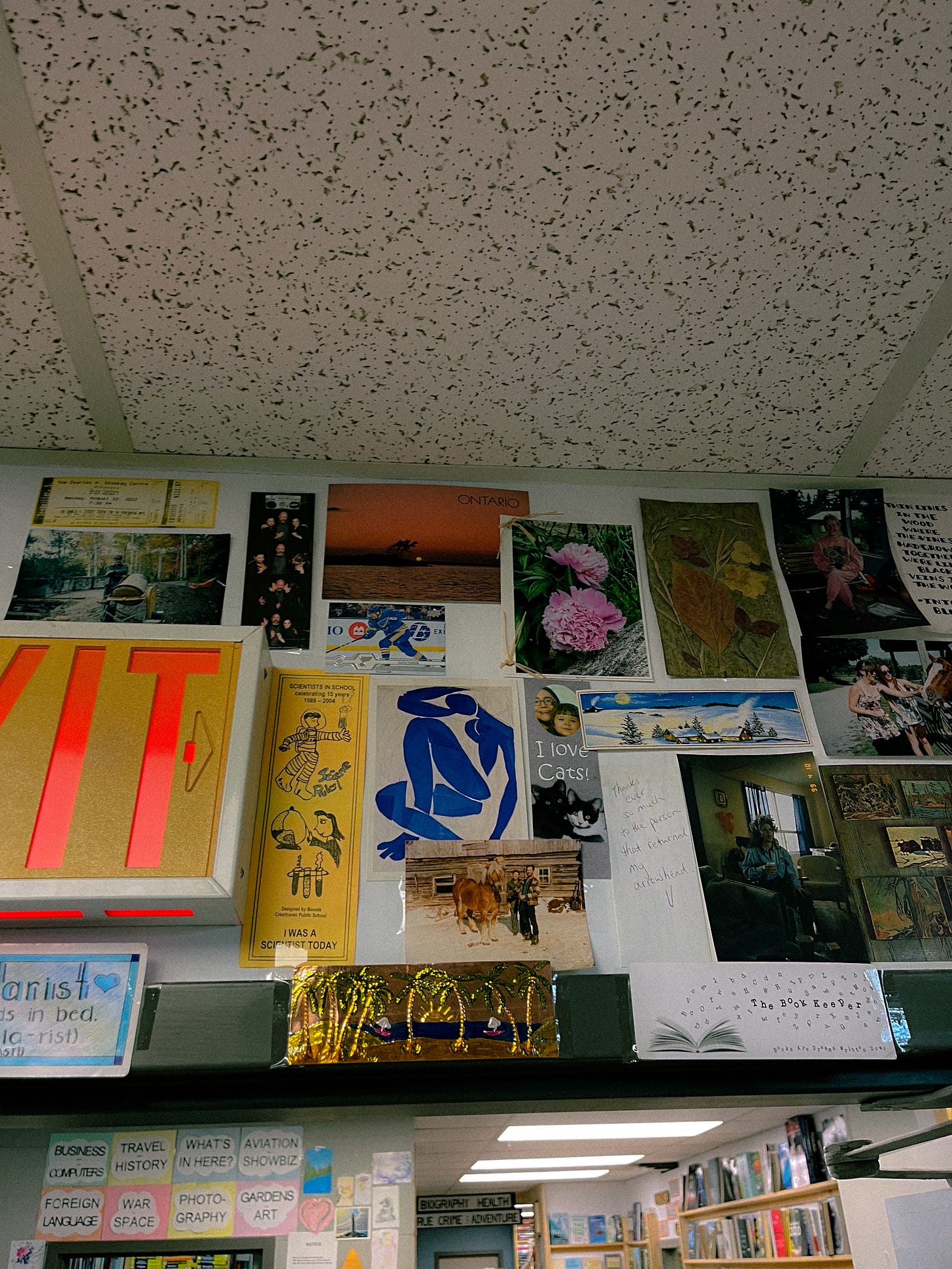A used book is a strange concept. I have loved them—their colour, their smell, their texture and weight—for as long as I can remember, yet I’m not quite sure that they exist.
What I mean to say is that the term “used” feels like an inadequate and maybe even misleading way to describe a previously owned book. Books do not strike me as the type of thing that you use, at least not in the way you might use a hammer or a paper towel or a straw. Unless it’s a cookbook or instructional manual (or an impenetrable modernist classic that has spent 3+ years propping up your laptop), it’s not immediately clear what it’s “for”, what it “does”. I mean, you obviously use it to read—to stare at words and think roughly corresponding thoughts—but what is that for? What is that doing?
It’s even less clear to me when a book becomes used, at what point in its lifespan it can be said to have served its intended purpose. Does it become used the moment you open it for the first time or the moment you close it for the last time? Did you really use it if you skimmed a chapter for a class, wrote a paper on it, and then never picked it up again? If you buy a used book and then read it, is it still used or is it now being used?
This is all to say that books are strange things, precisely because it’s weird to think of them as things. They’re physical objects, but they don’t tangibly act on the physical world in a clearly observable, measurable way. They transform it, and us, through more mysterious means.
The Argentinian writer César Aíra captures this mystery well. In Artforum, a book about a man’s obsession with a magazine, the narrator reflects that books “fulfill[] their condition as objects twice over … They [are] superobjects, because in their infinite variety and novelty they could supplant all other objects in imagination and desire”. They are objects that exist to point beyond themselves. In a strange way, they are almost like places, or maybe even means of travel.
In this spirit, I want to say that the idea of “use” is antithetical, or at least antagonistic, to what makes books valuable. For someone who happily dedicates a sizeable portion of his one life on Earth to reading, I’m wary of the idea that books need to have some kind of clearly identifiable (or worse—quantifiable) purpose to be worthwhile. I have a special dislike for those LinkedIn listicle-type pieces about how “These Philosophy Books (i.e. pop stoicism and, for some reason, Nietzsche) Will Help Level Up Your Mindset” or “Wow! These Classics Are Actually Still Relevant To Today’s World, Actually,” as if books are video game items that we must consume to increase our stats. I think this consumptive view of reading not only limits what we read, but how and why as well. It actively forecloses the deeper kind of exploration and transformation that reading can bring about.
This might make it sound like I have some special ire towards self-help books or other books written for more directly “practical” purposes. I truly don’t. I do, however, think that the cultural push towards finding some self-helpy message in every work of art and scholarship is a misguided approach that constricts our already narrow view of why engaging with the humanities is valuable in the first place. The notion that we need to read books in order to extract some predefined message that will improve our lives in some way comes very close to the idea of “using” them in the worst sense of the word.
I would prefer to think about a book like a forest in which we may choose to walk. Yes, you can “get something” out of it, you can use it to boost your step count or reduce your stress levels or whatever, but you can also just luxuriate in the richness of being able to see and feel and reflect on your own seeing and feeling.
So with all of that in mind, here’s a poem I wrote a few years ago on this very topic:
To Use A Book
1. Find a real used bookstore—
make sure there’s not a single white page in the place.
2. Slide a book from a shelf, judge it
by its front and back covers,
turn a few yellowed leaves and notice
how they all but
force you
to be delicate,
to handle them
as respectfully
as if their author
were there in the shop beside you,
pretending to ponder the Literature section
while subtly overanalyzing every movement you make
with a writer’s anxious attention.
Let them help you become patient,
reverent, and so, with time,
wise.
3. Close your eyes
and bury your nose
into the church roof
you create by opening it
and let the fragrance, like a story,
transport you into the world.
4. Once you’ve bought it
(and so become part
of its library), inhale
its story like a scent—like a scent,
feel it take shape
as your mother’s embrace,
a bright, serene
cluttered bedroom,
rain on your skin and green all around you.
5. Let it help you stitch your life
into the life of the world
and show you
why
to grow old.



A useful insight. Reading (often) leads to wisdom and wisdom is the only reason to grow old. Assuming you are already past the legal drinking age.
I appreciate the perspective- how do you think it applies to other forms of art?